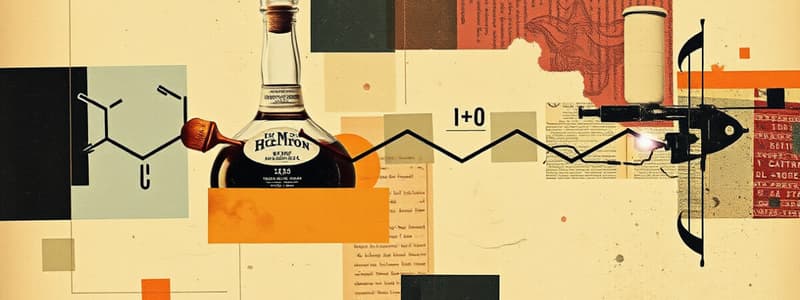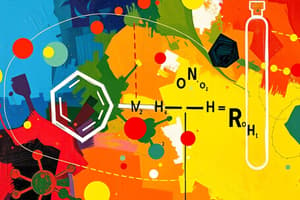Podcast
Questions and Answers
What mechanism does a 1 alcohol use when undergoing a substitution reaction with H-X?
What mechanism does a 1 alcohol use when undergoing a substitution reaction with H-X?
- E1
- E2
- SN1
- SN2 (correct)
Which reagent can be used to convert a 1 alcohol to a sulfonate ester?
Which reagent can be used to convert a 1 alcohol to a sulfonate ester?
- SOCI2 (correct)
- H2SO4
- PCC
- Swern oxidation
Which of the following statements is true regarding the oxidation of 2 alcohols?
Which of the following statements is true regarding the oxidation of 2 alcohols?
- Converted to ketones by chromium reagents (correct)
- Converted to esters by Swern oxidation
- Converted to carboxylic acids by chromium reagents
- Converted to aldehydes by PCC
Which mechanism is utilized for the dehydration of 1 alcohols?
Which mechanism is utilized for the dehydration of 1 alcohols?
What product is formed when a 1 alcohol is oxidized using PCC?
What product is formed when a 1 alcohol is oxidized using PCC?
What is the primary product when a 1 alcohol is oxidized using Chromium reagents?
What is the primary product when a 1 alcohol is oxidized using Chromium reagents?
Which reagent can oxidize a 2 alcohol into a ketone?
Which reagent can oxidize a 2 alcohol into a ketone?
In a dehydration reaction involving a 3 alcohol, which mechanism is followed?
In a dehydration reaction involving a 3 alcohol, which mechanism is followed?
Which of the following statements about the oxidation of 1 alcohols is incorrect?
Which of the following statements about the oxidation of 1 alcohols is incorrect?
What is the main characteristic of the substitution reaction of 2 alcohols with H-X?
What is the main characteristic of the substitution reaction of 2 alcohols with H-X?
Flashcards are hidden until you start studying
Study Notes
Substitution and Elimination of Alcohols
-
Substitution Reactions:
- H-X Substitution:
- 1° Alcohols and methanol follow the SN2 mechanism.
- 3° and 2° Alcohols follow the SN1 mechanism.
- Reagents Used for Substitution:
- PBr3: Effective for 1° and 2° alcohols.
- SOCl2: Suitable for 1° and 2° alcohols.
- Sulfonate Esters: Formation involves tosylates and mesylates.
- H-X Substitution:
-
Dehydration Reactions:
- Use of strong acids like H2SO4 or H3PO4.
- Mechanisms:
- E2 mechanism is used for 1° alcohols.
- E1 mechanism is utilized for 3° and 2° alcohols.
Oxidizing Alcohols
-
Chromium Reagents:
- 1° Alcohols and aldehydes are oxidized to carboxylic acids.
- 2° Alcohols are converted into ketones.
-
PCC (Pyridinium Chlorochromate):
- Converts 1° alcohols to aldehydes.
- Converts 2° alcohols to ketones.
-
Swern Oxidation:
- Functions similarly to PCC for oxidizing alcohols.
- Oxidizes 1° alcohols to aldehydes and 2° alcohols to ketones.
Substitution and Elimination of Alcohols
- Substitution Reactions: Alcohols react with hydrogen halides (H-X) to yield alkyl halides.
- 1º alcohols and methanol undergo substitution via the SN2 mechanism.
- 2º and 3º alcohols follow the SN1 mechanism for substitution.
- Reagent Applications:
- PBr3: Effective for converting 1º and 2º alcohols to bromides.
- SOCl2: Used for converting 1º and 2º alcohols to chlorides.
- Sulfonate Esters: Formed from tosylates and mesylates for better leaving groups in nucleophilic substitution.
Dehydration Reactions
- Acid Catalyzed Dehydration: Alcohols can be dehydrated to yield alkenes using strong acids like H2SO4 or H3PO4.
- 1º alcohols typically undergo dehydration via the E2 mechanism.
- 2º and 3º alcohols proceed via the E1 mechanism, forming carbocations.
Oxidizing Alcohols
- Chromium Reagents: Powerful oxidizers for alcohol transformations.
- 1º alcohols and aldehydes can be oxidized to carboxylic acids.
- 2º alcohols are oxidized to ketones under these conditions.
- PCC (Pyridinium Chlorochromate):
- Converts 1º alcohols to aldehydes.
- Converts 2º alcohols to ketones.
- Swern Oxidation: Similar to PCC but operates under milder conditions.
- Oxidizes 1º alcohols to aldehydes and 2º alcohols to ketones, offering an efficient alternative.
Studying That Suits You
Use AI to generate personalized quizzes and flashcards to suit your learning preferences.




